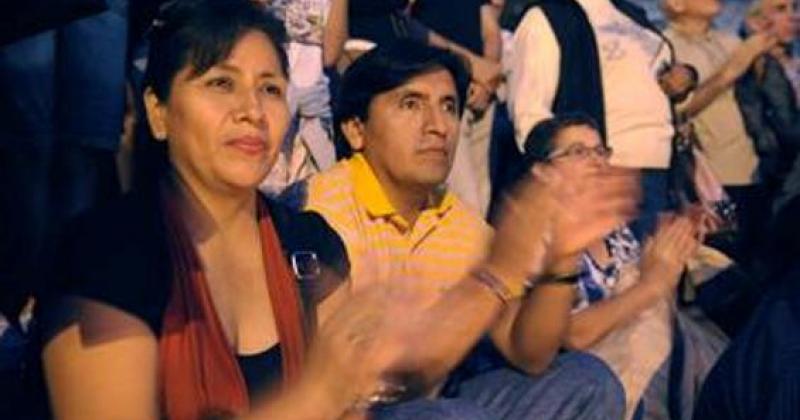At the presentation of the Pope’s upcoming trip to South America, the Vatican spokesman set the record straight on the participation of gay groups at the meeting in Bolivia and the use of coca leaves to prevent altitude sickness.
The first Latin American Pope in history will get the chance to spend a whole week speaking in his mother tongue. As was the case when he visited Lampedusa in Italy and Albania in Europe, Francis is to begin his visit to Latin America by visiting the continent’s poorer nations first (Ecuador, Bolivia and Paraguay), bearing in mind that the World Youth Day in Rio de Janeiro had already been scheduled by his predecessor, Benedict XVI. The Vatican spokesman, Fr. Federico Lombardi, presented the visit in the Vatican newsroom today. Francis’ intense week-long trip to his home continent will begin on 5 July and end on 13 July.
A real “tour de force” that will involve visits to high-altitude locations, a challenge to anyone, but especially Jorge Mario Bergoglio who had to have part of his lung removed as a teenager. “We know that a journey with sudden altitude changes can be demanding, but the Pope was not the slightest bit concerned or uncertain, he wants to do this leg of the journey and he is convinced he will do it well,” Fr. Lombardi said, in answer to a question about existing concerns over the Pope’s health during his Latin American venture. “Care was taken to ensure this part of the journey is brief, avoiding an overnight stay and with a bit of enthusiasm, we should all make it,” he added.
In answer to those who asked him about the possibility of the Pope chewing coca leaves or drinking coca tea to help him with altitude sickness, the Vatican spokesman said the following at today’s press conference on the papal visit: “Not as far as I know. But I wouldn’t be surprised because the Pope likes taking part in popular customs. The Pope will do as he sees fit. From what I know there are ways of dealing with the altitudes that form part of popular culture: some drink a sort of mate tea, others chew coca leaves. The Pope hasn’t talked to me about what he plans to do, we shall see. We’ll see if he follows local customs.” During his Apostolic Visit to Bolivia in 1988, John Paul II drank the coca tea he was offered to help relieve the effects of altitude sickness.
The papal entourage that will be flying with the Pope will be composed of: one cardinal, the Vatican Secretary of State, Pietro Parolin, one Vatican employee (as is customary on Pope Francis’ journeys), from the health service sector this time and the Secretary of the Commission serving as Vice-President, Guzman Carriquiry. Carriquiry replaces Cardinal Marc Ouellet, President of the Pontifical Commission for Latin America, who is otherwise engaged.
Although the visit to Ecuador, Bolivia and Paraguay is the first since the establishment of one single dicastery in charge of media, the Secretariat headed by Mgr. Dario Viganò, “I don’t think it will make any difference,” Fr. Federico Lombardi said in answer to a journalist’s question. “Only four days have passed and instructions have not yet been given Naturally, the Secretariat will have greater authority but for the rest, we will proceed as usual and changes will be introduced gradually; We will call Mgr. Viganò head-of-dicastery so as not to show disrespect,” Fr. Lombardi said smiling.
When asked whether a gay organisation would also be present among the various popular movements, the director of the Holy See Press Office stated: “I heard there will be gay groups present at one of the popular movement gatherings in Santa Cruz but I don’t think the Pope will give instructions about this or be selective about who should participate. , at any rate, have not received any confirmation about the Pope giving out instructions about this.”
Francis will be attending the final day of the 2nd World Meeting of Popular Movements in Santa Cruz, Bolivia on 9 July. As readers will recall, the first meeting took place in the Vatican last 24 October and the Pope gave an important speech on that occasion. The meeting in Santa Cruz is certainly significant in the context of the Pope’s visit to Latin America and in the context of his Pontificate as a whole. The President of Bolivia, Evo Morales attended the meeting in the Vatican not as a head of state but as a popular leader.
Francis is the fourth Pope, Lombardi recalled, to visit South America. Paul VI only went there once on a visit to Colombia, in August 1968. John Paul II travelled to the continent 18 times (his first visit was to the Dominican Republic, Mexico and the Bahamas in January 1979 and the last to Guatemala and Mexico in 2002). He visited all countries in the region. Meanwhile, Benedict XVI, went to Latin America twice and visited three countries (Brazil, Mexico and Cuba).
Fr. Lombardi mentioned the “difficult and recent conflicts” in South American countries, which were to do with borders or authoritarian governments. He explained that Francis’ visit “aims to foster the peace, harmonization, participatory development and democratic process”. This is Pope Francis’ “ninth international visit and the first time Francis visits three countries in one go”. There is one single theme for the papal visit, “the joy of proclaiming the Gospel”, although each of the three countries will have “different mottos”. “In terms of safety, I have heard that the climate is calm,” the Vatican spokesman stressed. “The Pope will use open-air Popemobiles prepared on site, along routes where he will be meeting a lot of people. When he needs to get around faster, he will use normal, closed but not bullet-proof vehicl
